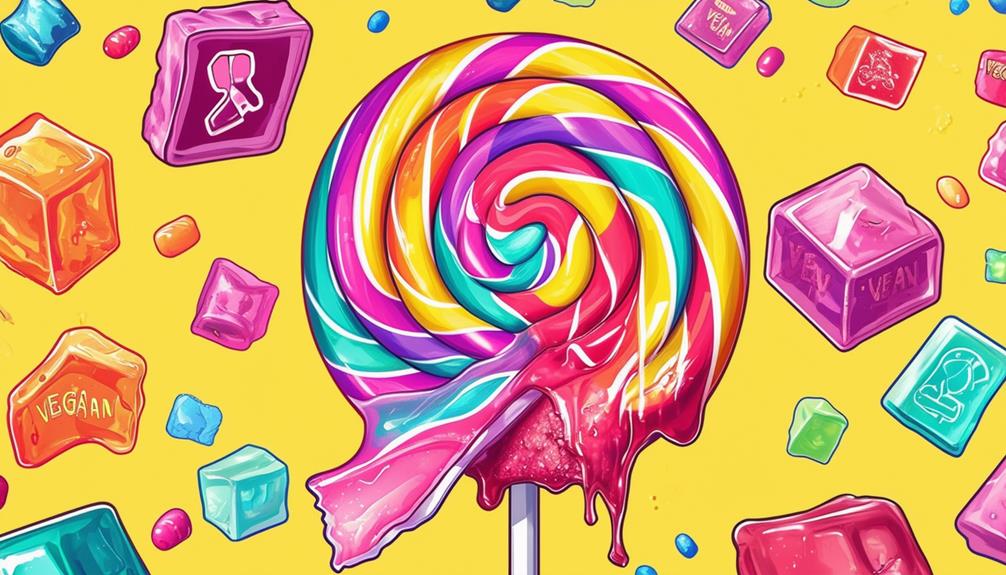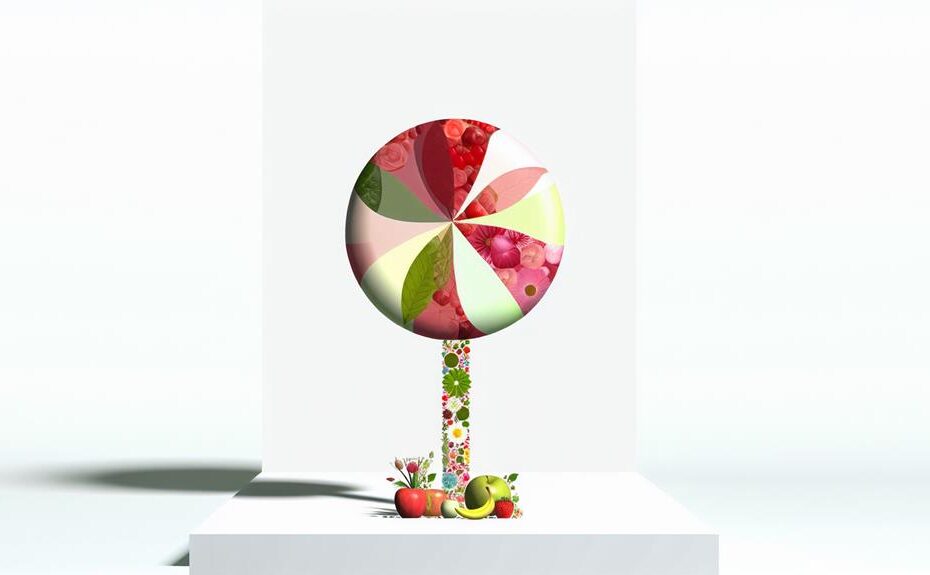As you unwrap a colorful lollipop, you might assume it's a harmless treat, but you'd be surprised what's lurking beneath the surface. You'll likely be shocked to realize that some lollipops contain animal-derived ingredients, making them off-limits for vegans. But don't toss that lollipop just yet – with a closer look at the ingredients, you might find that some are, in fact, vegan-friendly. The question is, how can you be sure? It's time to dig deeper and uncover the truth about these sweet treats.
Lollipop History Reveals Surprises

Delving into the history of lollipops reveals a fascinating story that dates back thousands of years, with ancient civilizations like the Arabs, Chinese, and Egyptians pioneering the concept of sucking on sweet treats. You might be surprised to learn that these ancient cultures, who didn't have access to modern candy-making techniques, still managed to create sweet confections that people enjoyed.
As you investigate the history of lollipops, you'll find that the concept of sucking on sweet treats has evolved over time, with different cultures contributing to its development.
Today, lollipops come in a wide variety of flavors, shapes, and sizes, catering to diverse tastes and preferences. But have you ever wondered if these treats are vegan-friendly? As a vegan, you might be curious about the ingredients used in modern lollipop production.
While ancient civilizations used natural sweeteners like honey and maple syrup, modern lollipops often contain animal-derived ingredients, making them non-vegan. As you navigate the world of candy, be mindful of the ingredients used in your favorite treats, especially if you follow a vegan lifestyle.
Lollipop Ingredients to Avoid
When investigating the world of lollipops, you'll want to be aware of certain ingredients that can make them non-vegan.
When scanning labels, you'll want to watch out for fruit-flavored options that might contain hidden animal-derived ingredients, in addition to sugar, corn syrup, and food dyes that may not align with your dietary preferences.
Fruit-Flavored Lollipop Options
As you discover the world of fruit-flavored lollipops, you'll find that many options are vegan-friendly. When scanning the ingredient labels, you'll want to steer clear of non-vegan ingredients like gelatin and honey.
Luckily, many popular brands offer delicious and cruelty-free flavors, including:
- Raspberry Fruit Flavor Option
- Orange Creamsicle Flavor Option
- Lemon Fruit Flavor Option
Raspberry Fruit Flavor Option
One popular fruit-flavored lollipop option that's often vegan-friendly is the raspberry variety, which typically gets its sweet and tangy flavor from natural fruit flavorings and sugars. When shopping for vegan lollipops, be sure to avoid gelatin, confectioners glaze, and dairy-derived additives.
| Vegan Lollipop Options | Non-Vegan Ingredients | Alternatives |
|---|---|---|
| Raspberry | Gelatin, dairy | Agar agar, carrageenan |
| Apple | Confectioners glaze | Plant-based waxes |
| Cherry | Dairy-derived additives | Fruit-derived flavorings |
| Orange | Gelatin | Pectin, carrageenan |
| Cola | None | – |
Orange Creamsicle Flavor Option
You'll want to exercise caution when reaching for orange creamsicle-flavored lollipops, as they often contain dairy products that make them non-vegan.
These treats typically include cream or milk-based ingredients, making them unsuitable for a vegan diet.
Always verify the ingredients list to make sure the lollipop is free from animal-derived products.
Lemon Fruit Flavor Option
Lemon fruit flavor lollipops provide a revitalizing option compared to orange creamsicle flavor, and luckily, they're usually made with vegan-friendly ingredients.
As a vegan, you can enjoy the zesty and citrusy flavor of lemon fruit in lollipops, perfect for satisfying your sweet cravings guilt-free.
These fruit-flavored treats are typically made with plant-based ingredients, making them a great vegan option.
Sugar, Corn Syrup, Food Dye
When you're scanning the ingredient list of your favorite lollipop, you might come across some familiar names like sugar, corn syrup, and food dye. While these ingredients might seem harmless, it's crucial to take a closer look at what else might be lurking in that lollipop.
Here are some specific ingredients you'll want to watch out for:
- Glycerin Emulsifier
- Artificial Flavor Improver
- Confectioner's Glaze Coating Agent
Glycerin Emulsifier
Your lollipop's glycerin emulsifier, a common ingredient in many sweet treats, can make all the difference in determining its vegan status. This ingredient can be plant-based or animal-derived, so it's important to check the label.
| Glycerin Source | Vegan Status | Brand Transparency |
|---|---|---|
| Plant-based | Vegan | Clearly labeled |
| Animal-derived | Non-vegan | Requires scrutiny |
| Unclear | Uncertain | Check with manufacturer |
| Not disclosed | Uncertain | Avoid or contact brand |
Artificial Flavor Enhancer
As you scan the ingredient list, be mindful of artificial flavor intensifiers like vanillin, ethyl acetate, and ethyl maltol, which may seem harmless but can compromise the vegan status of your lollipop.
These artificial flavor enhancers mightn't be vegan-friendly, so it's important to choose lollipops with natural flavorings or certified vegan labels to guarantee a cruelty-free treat.
Confectioner's Glaze Coating Agent
You might be surprised to learn that confectioner's glaze, a common coating agent in many lollipops, is actually derived from insects, making it non-vegan. As a vegan, it's important to avoid confectioner's glaze and instead opt for lollipops with alternative coatings like carnauba wax or vegetable-based glazes.
Always read labels carefully to make sure your sweet treat is free from animal-derived additives.
Gelatin in Lollipop Coating

When you're checking the ingredients of your favorite lollipop, you mightn't think to look for gelatin in the coating, but it's crucial to do so.
You're about to find out that gelatin, which gives lollipops their shiny finish and helps them hold their shape, is actually derived from animal collagen, making it non-vegan.
Now, let's delve into how gelatin's presence affects the vegan status of lollipops and what alternative ingredients are used in vegan lollipops instead.
Carmine-Coated Lollipop Centers
As you venture into the world of lollipops, you'll find that some lollipop centers are coated with ingredients that might surprise you.
When it concerns carmine-coated lollipop centers, you'll want to investigate the coating agents used.
Let's delve deeper into some common coating agents that might impact a lollipop's vegan status.
- Beeswax Coating Agent
- Lanolin Wax Coating Agent
- Shellac Coating Agent
Beeswax Coating Agent
One common ingredient used to give lollipops their glossy appearance is beeswax, which raises concerns for vegans.
You might be surprised to find beeswax in some lollipop coatings. Moreover, some lollipops contain gelatin in their coating, making them non-vegan.
When shopping for vegan lollipops, be sure to read labels carefully to avoid these animal-derived ingredients.
Lanolin Wax Coating Agent
You'll encounter another non-vegan coating agent in some lollipops: lanolin wax, derived from sheep's wool, which raises more concerns for vegans.
This wax isn't vegan-friendly, making it important to check the ingredients list. Look for vegan-friendly alternatives or opt for lollipops that explicitly state they're free from lanolin wax and other non-vegan components.
Shellac Coating Agent
Some lollipops' shiny coating is actually thanks to shellac, a resin secreted by the lac insect. As a vegan, you should be aware that shellac is an animal-derived ingredient, making some lollipops non-vegan. Be sure to check the ingredient label to ensure the lollipop is free from shellac and other non-vegan ingredients like carmine.
| Ingredient | Vegan Status |
|---|---|
| Shellac | Non-Vegan |
| Carmine | Non-Vegan |
| Plant-based Coatings | Vegan |
| Lanolin Wax | Non-Vegan |
| Vegan-Friendly Lollipops | Vegan |
Hidden Animal-Derived Ingredients
As you investigate the world of lollipops, you might be surprised to find that some coatings contain hidden animal-derived ingredients. You've already learned about carmine-coated lollipop centers, but there's more to explore.
Now, let's examine other sneaky sources of animal products in lollipop coatings.
- Cochineal insect extract dye
- Honey-based wax coating agent
- L-Cysteine hair-derived agent
Cochineal Insect Extract Dye
When unwrapping a seemingly harmless lollipop, you might inadvertently consume a surprising amount of insect-based ingredients, courtesy of cochineal insect extract dye. This red dye, also known as carmine, is derived from crushed cochineal insects, making lollipops that contain it non-vegan.
Be sure to check the ingredients label to avoid this hidden animal-derived ingredient in your lollipops.
Honey-Based Wax Coating Agent
You might be surprised to find that even the shiny coating on your lollipop can harbor animal-derived ingredients, namely honey-based wax and gelatin. These hidden components make your lollipop non-vegan.
Honey-based wax is derived from bees, while gelatin is an animal byproduct. Be sure to read labels carefully to avoid these animal-derived ingredients and choose vegan-friendly lollipop options instead.
L-Cysteine Hair Derived Agent
L-cysteine, a hair-derived agent, sneaks into lollipop coatings as a dough conditioner and flavor intensifier, potentially rendering your sweet treat non-vegan.
As a vegan, you mightn't be aware that L-cysteine, derived from animal hair, feathers, or hooves, is hidden in some lollipop coatings.
Opt for certified vegan lollipops to avoid this animal-derived ingredient.
Silk Worm Cocoon Extract
Many lollipops may contain a surprising animal-derived ingredient: silk worm cocoon extract, also known as sericin, which is often used as a glazing agent in lollipop coatings.
Since sericin comes from silk worm cocoons, it's not vegan-friendly. Be cautious and read labels carefully. Opt for vegan-friendly brands to guarantee your lollipop treat is truly vegan.
Sweet Freedom in Lollipops
With a vast array of flavors and colors, vegan lollipops offer a sweet escape from the restrictions of traditional sweets. You can indulge in these treats without worrying about animal-derived ingredients like gelatin, honey, or dairy. Instead, vegan lollipops may use plant-based alternatives like agar agar or carrageenan to provide that sweet fix.
Many popular lollipop brands now offer vegan options with fruit flavors and natural colorings, making it easy to find a vegan lollipop that suits your taste buds.
When shopping for vegan lollipops, it's important to read ingredient labels carefully to make sure they're free of animal products. You'll be surprised at how many brands now cater to vegan consumers.
Vegan lollipops are a sweet treat that can be enjoyed guilt-free by plant-based and non-plant-based individuals alike. So, go ahead and indulge in that fruity or sour flavor you've been craving – with vegan lollipops, you can have your sweet freedom without compromising on your values.
Conclusion
So, are lollipops vegan?
The answer is, it depends. While fruit-flavored lollipops are often a key point to scrutinize ingredients for hidden non-vegan culprits like gelatin, honey, or dairy.
Opt for certified vegan lollipops made with plant-based alternatives, and you can indulge guilt-free. Remember, always check those labels carefully to make sure your sweet treat aligns with your vegan lifestyle.
